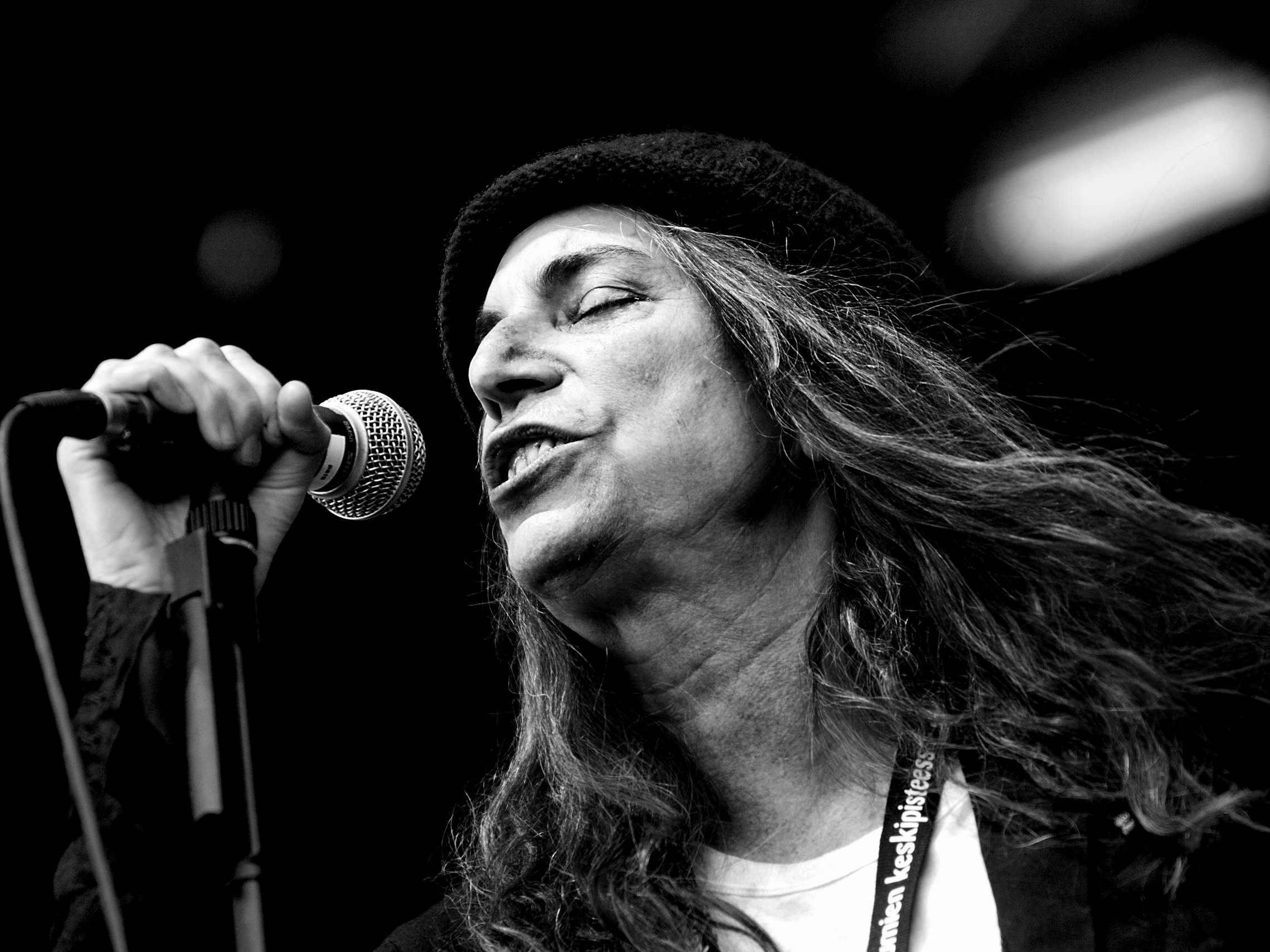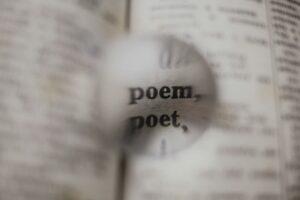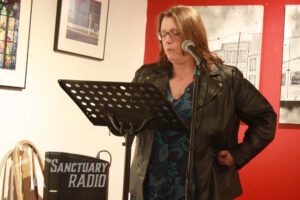“Why do we write? A chorus erupts./ Because we cannot simply live.”
-Patti Smith, Devotion
It’s not often these days that a poet can fill a 1500-seat theater, let alone keep an audience’s attention for almost two hours. And yet that’s exactly what Patti Smith did at the Ulster Performing Arts Center in Kingston, NY on November 13th. Early on Smith had made a mental note to herself to never be boring in her performances, and she has kept to that during her 40+ year career as a writer/poet/musician. She is not one for verbal pyrotechnics but has created a body of work inspired by her beloved Rimbaud, with dashes of Burroughs and Ginsberg for good measure. The end result, however, is all pure Patti Smith.
I prepared for the show like I was researching a doctoral thesis. I am particularly drawn to her trio of memoirs, the first of which, Just Kids, received the National Book Award. Smith took a few years off to raise her kids in the most domestic of settings, suburban Michigan, but after the sudden death of her husband Fred “Sonic” Smith (no relation before marriage) in 1994, she returned to a sort of public life. She touched on the three relationships that had the most profound effects on her and read from each of the books I had crammed within the weeks before. Luckily for me, the accuracy of the performance was assured by a chatty superfan sitting directly behind me and my Beloved up in the balcony, narrating and clarifying for a perhaps less well-versed companion. A maskless glare reduced her volume, but not her compulsion to display her cradle-to-now memorization of the facts.
Smith wisely did not rely heavily on verse for most of her time on stage. Although billed as, “An Intimate Evening…,” in fact she had misplaced the email describing the format of the long-postponed show, and in what seems to be typical Patti Smith fashion, grabbed a few books on the way out the door. She was accompanied on stage by longtime bandmate Lenny Kaye and performed several songs in her clear, no-bullshit style. In between, she shared favorite excerpts from the exact books I had reread for the occasion. It was reassuring to know that some of the very passages that touched me the most deeply were important to her as well.
I’d finished Devotion just the night before, based on a Yale lecture Smith offered pre-Pandemic. It’s part of a series titled, “Why I Write,” and in it Smith describes, as she does in every book, her familiar method. Here, though, she links a bit more directly to how her travels and observations feed her writer mind. This book contains a haunting short story at its core that I have yet to entirely wrap my head around. Thoroughly accessible, it’s set in a post-War Europe and can be welcomed into the reader’s mind on a number of levels. But it’s not the story that compelled me in this work so much as the message she closes with, a passage that she shared again during the performance.
I’m not certain how many in that 1500-person audience last night were writers themselves, or even artists of any kind. And that’s a wonderful thing. I would love to convince more listeners that poetry is no longer subject to testing and grading after high school, but an art subject only to the listener’s interpretation and not a measure of a pupil’s self-worth. Smith has created a unique combination of music, words, and personal energy that attracts all kinds of people, a something for everybody performance. Me? I loved the music, but very much want to see the lyrics, as much poetry as her poems. Her straightforward style recalls a little something of how the best Bards must have presented their work in days of yore.
The words she closes Devotion with, the words that brought me to tears, expressed for me the reason I write, the blessed compulsion that I can’t myself completely explain. A phrase floats around my crowded brain, “…the unexamined life,” the origin of which I could probably Google these days but have no need to. I will never be satisfied with only observing, with being in the moment (sorry, Ram Dass), allowing the days to pass without record or contemplation. I am not able to tune out that way. A blessing and a curse, but the poet’s life has enriched the experience for me in ways I never expected.
Granted, it may be the reason I don’t notice the cobwebs until they block my path down the stairs. Or why I forget how grey my hair has gotten until I see myself in others’ photos, waiting in line to have my vaccination card checked before a show. But those things are temporary. Poetry lasts. I may never be voted into the Rock & Roll Hall of Fame. But maybe a poem will touch a part of someone that has been asleep. Maybe a word will outlive me.





